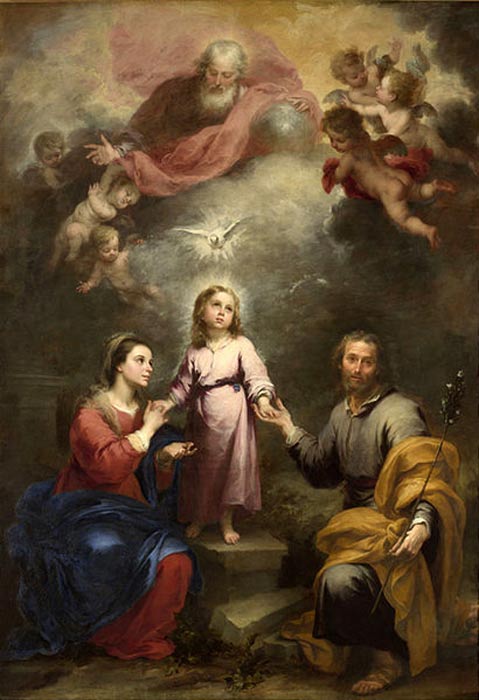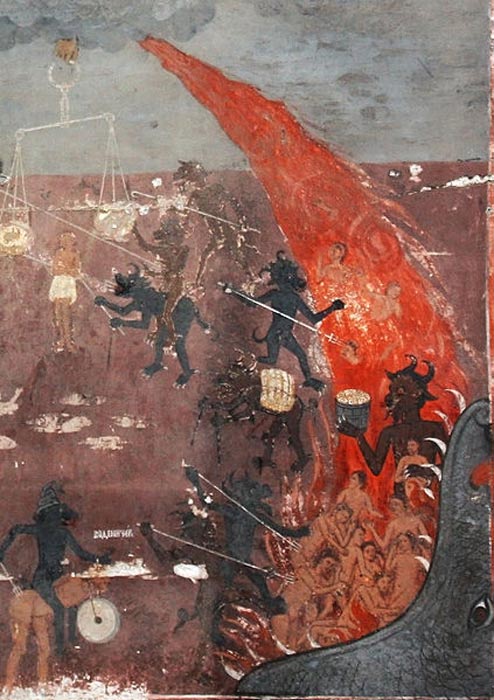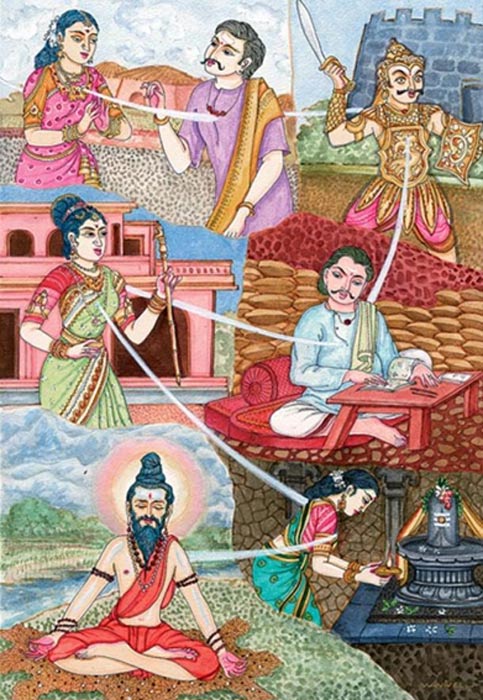Hidden Beliefs Covered by the Church? Resurrection and Reincarnation in Early Christianity
Is it possible that early Christians believed in reincarnation? Although some may find this idea unbelievable, several Christian sources (including the Bible) suggest that many centuries ago, it was common to believe that one does not come to Earth just once, but various times.
In 1945, researchers discovered some early Judeo-Christian writings. Two years later, the world heard about the Dead Sea Scrolls, the discovery which changed biblical history. The early Christians and Jews followed the teachings of Jesus - including the concept of resurrection. There are several examples of this found in ancient resources.
The oldest texts provide two concepts of resurrection: spiritual and bodily. The spiritual rebirth by the Holy Spirit is also known as being born again. A bodily resurrection of a human could also be called reincarnation. According to the first important father of the early Orthodox Church, Origen (185 – 254 AD), the soul exists before birth. He suggested that pre-existence was found in the Hebrew scriptures and the teachings of Jesus.

The Holy Spirit depicted as a dove descending on the Holy Family, with God the Father and angels shown atop, by Murillo, (c. 1677). (Public Domain)
Moreover, the writings of Clement of Alexandria - a disciple of the apostle Peter, suggest that his master received a few secret teachings from Jesus. One of them was related to the concept of physical and spiritual rebirth. The secret teachings confirm some writing in the Bible. There is a fragment which suggests that Jesus knew about reincarnation and past lives. Someone in the crowd apparently asked him: “What sign showest thou then, that we may see, and believe thee? what dost thou work? Our fathers did eat manna in the desert; as it is written, He gave them bread from heaven to eat. Then Jesus said unto them, Verily verily, I say unto you, Moses gave you not that bread from heaven; but My Father giveth you the true bread from heaven” - John 6:30-32
- Past Life Memories of Children and Past Life Regression: A Case for Reincarnation?
- Chinese government says Dalai Lama must reincarnate to respect tradition
- Omm Sety – A British Woman Whose Life Was Lined by Reincarnation and Connected to a Pharaoh
Jesus doesn't refer to “your fathers”, but “you”, signifying that the story is connected with every person. In Deuteronomy 18:15, Moses said: “The Lord your God will raise up for you a Prophet like me from your midst, from your brethren. Him you shall hear.”
Once more, Moses doesn't say “your children”, but “you”, indicating that it would be the same people to whom he was speaking that would see and hear the Messiah. According to many specialists in the Bible, there are many examples which promote the belief that reincarnation was well known and a fully accepted fact for early Christians.

Moses Pleading with Israel, as in Deuteronomy 6:1-15. (Public Domain)
Major Medieval Alterations
In the early medieval period, the doctrines of pre-existence and reincarnation only existed as Jesus’ secret teachings. In 553 AD this information was declared heresy at the Second Council of Constantinople. The Roman Church decided to destroy all the teachings which talked about it. The Catholic doctrine and the priests’ source of wealth could have been in danger if people believed that they would come back to life many times. The old knowledge faced the same fate as many ancient books by pre-Christian writers. The bishops were afraid of the knowledge which could prove that the institution of the Church wasn't the only option to bring “eternal life” to people.
During the Middle Ages, the growing Christian religion faced new unexpected problems. With the rising number of priests, bishops, parishes, and churches the new religious structure needed more money. Due to these needs, they also invented celibacy, to allow the church to own everything what belonged to their priests.
Moreover, they decided to invent more terrible outcomes for Christian followers if they didn't do what the bishops expected of them. In the ancient writings, there is nothing about asking the priest to ask God to release individuals from their sins…or even a place called Hell - where the people who broke God’s rules were said to go after death.
- The Past Teaching the Present: Ancient Sanskrit Texts Discuss the Importance of Environmental and Species Conservation
- Earth, Air, Fire, and Water: Empedocles of Acragas - The Pre-Socratic Philosopher with a Sense of Style
- The Aztec Calendar Wheel and the Philosophy of Time

А fresco detail of Hell from the medieval church St. Nicolas in Raduil village, Bulgaria. (Edal Anton Lefterov/CC BY SA 3.0)
Another aspect which made the Church even more resistant in allowing the belief in reincarnation was related to the Crusades. During the Crusades, people were offering all they had to the Church and fought in the name of Jesus. The religious fighters may have been less intent to lose their lives for their religion if they thought they would be reborn in the future.
When the Inquisition started to kill people for crimes of heresy and witchcraft, the religious society remained silent. Although they were losing neighbors, friends, and family, the Christians believed that it was necessary to stay on the right side of the Church and Inquisition if they wanted to go to Heaven. A belief in the rules of karma and reincarnation wouldn't have allowed the leaders of the Inquisition to hurt so many people.

Images representing immortality. (Gnostic Warrior)
The Church’s Current Views on Reincarnation
Nowadays, some Christian churches say that it is possible that reincarnation exists. One of the most liberal of these organizations seems to be the Church in the USA. However, the belief in reincarnation is still more applicable to Buddhism or even New Age followers. The idea of reincarnation has never been fully accepted by the Catholic Church. If they would permit reincarnation as a belief, it would ruin all of the doctrine they had created over the years. It may not fully destroy Christianity, however, it would bring it back to the beginning, before the transformations the Church made. As long as people believe that only God can punish evil, the Church sees no need to apply the impersonal law of karma and other lessons which reincarnation brings.

Reincarnation. (Himalayan Academy)
Top Image: The Resurrection. (c. 1715-1716) By S. Ricci. Source: Public Domain
References:
Reincarnation in the Bible by Kevin Williams, available at:
http://www.near-death.com/reincarnation/history/bible.html
May a Christian Believe in Reincarnation? By Abbot George Burke
http://ocoy.org/original-christianity/may-a-christian-believe-in-reincarnation/
Reincarnation and Christianity, available at:
http://www.comparativereligion.com/reincarnation3.html
Christians and reincarnation, available at:
http://americamagazine.org/issue/christians-and-reincarnation
Ernest Valea, (2016) “REINCARNATION: Its meaning and consequences” ComparativeReligion.com [Online] Available at: http://www.comparativereligion.com/reincarnation3.html#01
The Reluctant Messenger (2016) “Christian Reincarnation”. Reluctant-Messenger.com [Online] Available at: http://reluctant-messenger.com/origen10.html
"The Big Book of Reincarnation", by Roy Stemman, p. 14
"CHURCH FATHERS: Letter 124 (Jerome)".

















Comments
I have not read every book in existence so I am not able to make such a judgement. But I know what you are saying. I have had some amazing spiritual experiences and so I had to read to help explain these experiences and the bible was a good guide for some of these experiences.
I always get caught up with the reference to God being He. I am not sure this is what was originally defined traditionally. The Father who is the Celestial cosmological figure who resides in the Heavenly realm was considered the male figure. This was considered by the Egyptians as a female figure, the body of Nut so a gender stance was a considerable issue here. God is a Universal figure who consumes all of these microcosmic forms within the Universal structure. Somewhat unclear is the connection to the traditional World body as a male figure of Geb for the Egyptians verses a Motherly Holy Spirit.
I am interested to question your feelings and understanding of having past lives. Do you believe that some people have had past lives or we all have?
Do you think some are born fresh new or independent of past life experiences?
Do you think people can share past life experiences with others, at the same time?
Do you define past lives including an animal life?
I was expressing my beliefs and the existance of other belief systems as they support this article, not to say it is absolutely true, Not everything can be proven scientifically at this point, we just don’t have the tools. I believe in mystery as even science can not explain why every blade of grass is different and why it became so, as an example. In having mystery exist and trying to put life into perspective our mind grows, our heart/love can grow with appreciation and we know we are part of something bigger than ourselves.
In my opinion, the bible is the greatest book ever written. It is a spiritual book and a guide. It is the best book written about human behavor and consequences (that God clearly states he [yang] will dole out). However, it hasn’t worked yet due to humans stepping into God’s role.
I am glad that we are finding more parts of the bible that completes, what I call the circle. I do not believe in the apocalypse where those that are chosen will go to heaven. Humans might create an apocalypse on earth soon and that is a different matter. A spiritual reincarnation can happen with everyone at any level of vibration, Jesus achieving that highest as one example. I can only speak of myself that I have had past lives. I do not have a collective conscientiousness of the past but I do feel universal love.
From an early age I was introduced to a spiritual World. I had to rethink what I was offered to believe. I was introduced to the cosmological structures of life which we reside on and are surrounded by. A trend is constant through most cultures and I believe a basic awareness was once communicated globally about the traditional structures in life. These structures are physical and are repetitive in the basic design, but they are separated by size and time. We live on Earth as with our other forms of life and we live within a time structure. This parameters of the total time physically is governed by the life-cycle of the planet. From genesis to revelations. This is a home for our existence as terrestrial beings.
Most cultures refer to the Earth as a being, a nurturing body, Gaia, Mother Earth, Geb. Earth can also be seen traditionally divided into anatomical parts, as evidence of traditional comprehension. Before the days of technology the next structure in life was larger again and this was our surrounding Celestial sky. Our heavenly Celestial body, This has been given many names from around the World but also takes on a form related to the simple structure of the human body. From here I think it was logically surmised that a Universal structure, larger once again of which all that we know is a part of.
So here we are as specks of sand on the Earth, but the Earth is a speck of sand within the Heavenly structure, which becomes a speck of sand within a Universal formation....Each speck of sand however comprises of the same building blocks or template.
As far as I can gather, the combined history of all of life on Earth, past and present forms to define the characteristics of Planet Earth. This as a collective energy system could be considered a closed system the atmosphere that is and surrounds the planet with cultural variations. A fuller comprehension of the continuous aspect of life can be extended once an understanding of planetary motion and planetary formation is achieved.
One text is the Gospel of Thomas which is part of the newly discovered Nag Hammadi texts (discovered 1945-1947). Most are composed about the same time as the Biblical gospels in the 1st and 2nd century AD. In this gospel, Jesus declares that his disciples must hate their earthly parents (as in Luke 14:26) but love the Father and Mother as he does, "for my mother (gave me falsehood), but (my) true Mother gave me life." In another Nag Hammadi discovery, The Secret Book of James, Jesus refers to himself as "the son of the Holy Spirit."
I always knew there was something missing from the Catholic bible, which I read twice. I also studied the Protestant bible with a Pastor. Jesus was resurrected. Why can’t we? He gave gifts to his disciples to give to us. Some Protestant sects teach we can be like Jesus if we believe. I am studying Taoism, which is NOT a religion. It is about being and non-being with our feet upon the earth and being in the spirit realm at the same time. Also there is the belief that our energy still exists when we die and I believe this too. Physics backs this up. Our body goes back to the earth, “ashes to ashes” and our “soul” returns as energy to the Universe, the Creator. Taoism believes our human spirit and our universal soul once achieving the state of Tao gets resurrected and can be reincarnated. This is achieved by following the 81 steps of meditation. Not easy but then Jesus didn’t have it easy either.
Whom are you asking?
Shabda, I am asking nobody in particular. I read with interest the historical points of view, but it makes me wonder if people comprehend or have any in-site into what it actually is and how it works. I have been shown the physical order, anatomical structure and life cycle of the Earth and planets. This as traditionally expressed correlates to the Celestial order which is also recognisable as a physical structure. From my perspective I therefore ask all, if they comprehend the process of life on Earth in terms of reincarnation, carnation, transmigrating..... Resurrection being obviously a different subject.
Pages